Comparative Analysis Of Objective Assessment And Self-Assessment Of University Graduates Professional Identity
Abstract
Training at university involves assessment of the outcomes of educational activities aimed to form graduate’s professional identity. The need to obtain objective information concerning the level of professional identity of a university graduate has led to analyzing the available scientific and pedagogical experience in the field of assessment and assessment procedure. Consequently, it caused the need to turn to search and selection of methods for implementing the complex objective assessment procedure in conjunction with the students’ self-assessment, development of tools for an objective assessment of personal, meta-subject and subject outcomes, self-assessment. The method of humanitarian examination of university graduates’ training achievements has been adopted as one of the methods of external objective assessment. With the purpose to identify self-assessment, interactive technologies of pedagogical workshops, pedagogical laboratories and training through sensory perception were applied. The combination of methods of external (objective) assessment and internal and analysis of the results enabled to conclude that it is necessary to take into account the combination of regulatory requirements and developed criteria in the assessment process. The results of the experiment led to the conclusion that not all of the studied professional identity indicators are assessed adequately from the standpoint of an independent objective assessment and from the standpoint of subjective self-assessment. The positions of an expert and a student do not coincide in assessing the value-behavioral component. The results of the study subjected to statistical processing confirmed the need to develop psycho-pedagogical approaches and a special diagnostic technique.
Keywords: Professional identityobjective assessmentsubjective self-assessment
Introduction
According to psychologists, we do not use assessments in studying the world around us since we perceive the objective world with the help of senses. Such knowledge is primary in relation to any activity that is based on it according to how the whole baggage of obtained knowledge can be compared to one’s own abilities. Therefore, a person can translate knowledge about the world and himself/herself into a language of concepts possible to be used in the process of managing behavior and activities. According to the opinion of Baturin (2008), Tugarinov (1971), an assessment system can represent such a language based on the postulate of mental functions trinity presented in the form of the following sequence: cognition – evaluation – action. Assessment reflects the so called “real knowledge”, i.e. knowledge about the object of knowledge and “future knowledge” in terms of behavior in relation to the object and in the form of an objective attitude.
In his work “Attitudes and attitude change”, Tesser and Shaffer (1990) writes the following about assessment significance: rating is the single most important concept associated simultaneously with emotions, thinking and activity. Taking into account the opinion of Bodalev (1970) that “evaluation standards” are often synonymous with “social standards” that underlie evaluation, therefore, we assume that they can be used as standards for subject categorization with subsequent evaluation of the professional identity development.
Problem Statement
In general, over a fairly long period scientists and practitioners have developed the following: publications of Voronova and Malygin (2018) are devoted to regulatory and psychological approaches to an independent assessment of the educational activities’ quality. Akimova (2017) writes about the approaches and evaluation criteria, including the ones implemented in a modern university. Lyakh (2017) conducts a comparative analysis of assessment systems used in pedagogy of the Russian Federation and abroad. The scientist revealed the presence of similarities in the concepts and principles used for cognitive, competence-based and student-centered approaches to learning. The work of Sholotonov (2015) is devoted to the application of competency-based approach. Neumoeva-Kolchedantseva and Polovnikova (2017) consider the aspects of pedagogical assessment within the framework of the subject-activity approach and modern requirements for pedagogical assessment, which reflect its “personified” nature. The work of Koksharova (2009) is devoted to the selection of performance criteria for assessing the quality of training tests.
Neumoeva-Kolchedantseva, Verkhovtsev, and Verkhovtseva (2016) work on the evaluation procedure implementation, they conduct an assessment of the value potential of a pedagogical university educational environment. Assessment based on the emotional background in the workplace and analysis of its results is demonstrated by Shekar and Suganthi (2015). The works in the field of psychology and pedagogy dedicated to the problems of meaningful learning motivation of students are performed by Kozachek (2008) and Makshantseva (2016).
Holdnak, Clemons, and Bushardt (1990) study the area of assessment methodology and Smoll, Smith, and Barnett (1993), Barrett, Webster, and Wallis (1999), Orlenko and Malyk (2017) cover the field aimed to increase children’ independence. In 2014, Antipin considered the problem of assessing the professional activities of the teaching staff as a mechanism for independent assessment of the education quality. Kovalev (1975) noted that assessment affects the activities and behavior of a team. Tzacheva and Jaishree (2018) analyze the effectiveness of active learning methods. The results of their work show that the implementation of these methods is associated with the growth of positive emotions in students.
Trainev (2013) reflects the experience of using the methods of expert parametric estimates based on the results of the information and educational projects implementation.
Chikova (2014) made an attempt to assess the relevance of the European system of credit transfer credits (point-rating system) from the standpoint of students’ cognitive activity.
There is an accumulated practical experience, including the work of Zhigalev (2009) presenting analysis and synthesis of scientific theoretical publications and practical materials in the field of education quality assessment in national universities. Isaeva (2013) assesses the quality of higher education through the activities of a university teacher and their pedagogical culture. Similar work was carried out with students being the future teachers in 2009 by Kovel, Glinkina, and Zorina (2009). The article deals with the issue of the development of teacher competence concerning implementation of objective assessment and self-assessment based on the introduction of the method of dialectical education in the educational process. This aspect is covered in the work of Losev (2018) as well). The experience of using digital technologies in the development of schoolchildren’ research potential is described in the works of Makotorova (2018).
However, the contradiction, which consists in the search for approaches and methods of approximating the results of objective assessment and personal self-esteem in the process of using appropriate approaches, universal criteria and pedagogical methods to adequately compare the results of the professional identity development, is still not resolved.
Research Questions
We have chosen the approaches and methods enabling to obtain subjective self-assessment of students’ educational achievements and to compare these results with an objective assessment as the subject of the article.
Several meanings of the notion “assessment” are given in the modern large explanatory dictionary of the Russian language and they are as follows: assessment as an action (to assess, evaluate); as an opinion, a judgment about the qualities of something; as a result of assessment; price assigned or determined by someone; as a mark set by a teacher (SlovarCC, 2010).
If we consider the concept from this perspective, we can distinguish the process and the result as the characteristics of the notion “assess” denoting actions. However, both of them are closely interrelated, since the process is an action resulting in arising a judgment, therefore the result of the assessment can be presented as a value judgment (or evaluation category).
In practice, the term “assessment” is used both as a process and as a result, therefore for functional refinement it is accepted to use the term “assessing” instead of “assessment” in the meaning of process.
Assessment as a “mark” has a rather interesting connotation. According to Ananyev (1935) and Amonoshvili (1984), a mark adopted in educational institutions is nothing else but the form of the numerical expression of the assessment of students’ knowledge and skills. Baturin (2008) agrees with them and believes that “assessment” as a synonym for the word “mark” more fully reveals the meaning of this concept. It also enables to reflect the process and the result of a subject expressing their opinion about something.
In philosophy, it is a standard practice to distinguish the following three functions of assessment: the first one is associated with the knowledge of object value properties, the second one deals with the expression of a person’s subjective attitude to reality, the third function is linked with the regulation of behavior and practical activity. In pedagogical science, the term “control evaluation” is used. Their function is formulated by Ananyev (1935) and is called “orienting” function, whose distinguishing feature is feedback, for example, knowledge of learning outcomes, praise and censure. Miasishchev (1960) proposed another function, an emotional one, which is expressed in the reaction, including the positive and negative assessment of an object.
Following the classification of estimates proposed by Baturin and Karlyshev (2009), assessments relating to the pedagogical field of activity should be attributed to the group of professional people used in the professional activity organization).
It follows from the assessment frame developed Baturin and Yusupova (2008) that the structure of assessment consists of four components: the process of cognizing the object of assessment; the process of updating or forming an evaluation base; comparison of 1 and 2; the process of expressing the result of a comparison in one of three forms being value judgment, affective experience, behavior change.
Purpose of the Study
The research objective is to search for approaches and methods that allow to adequately compare the subjective self-assessment of the results of students’ educational activities and the results of an objective assessment to determine the level of graduates’ professional identity development.
Research Methods
Students majoring in ecology and studying the graduate course of the bachelor degree were selected to be an object of study. Among the research methods, it is necessary to single out theoretical ones (comparative analysis of the scientific literature on the subject of the research).
The following empirical methods are implemented: a pedagogical experiment with the predominance of interactive methods (pedagogical laboratories and workshops, training through sensory perception, etc.), questioning, testing, humanitarian expertise, and statistical analysis of results.
Pedagogical workshops are classes developed on the basis of actualizing the existing experience and knowledge, insighting, independent creative activity with various forms of student organization (frontal, working in pairs, microgroups) with regular reflection and feedback. The pedagogical laboratory is distinguished by a deeper communication with students’ microgroups focusing on various scientific and professional problems. Classes built on the basis of sensory perception help to obtain primary knowledge and generalize it at a higher level.
The method of humanitarian expertise is implemented in the work of an expert group evaluating the outcomes of students
Findings
In our study, assessment of students’ educational achievements is connected with the development of their professional identity, therefore, we relied on the property of assessment, the rule of comparing the assessment property with the assessment basis (scale) in the assessment process. The result obtained was expressed in the form of judgment or in the degree (level) of compliance with the evaluative property.
Self-esteem is a self-awareness element characterized by emotionally saturated assessments of oneself as a person, one’s abilities and abilities, moral qualities and actions, role in future professional activity among colleagues that are an important regulator of behavior.
Following the recommendations of Schneider (2001) it is customary to understand professional identity as not only the awareness of one’s identity with a professional community but also its assessment, psychological importance of membership in it, shared professional feelings, a peculiar mentality, a sense of professional competence, independence and self-efficacy, i.e. experiencing their professional integrity and certainty. We have identified cognitive (subject component of the Federal State Educational Standard (FSES)), value (personal, according to the FSES) and activity-behavioral (metasubjective, according to the FSES) components within the framework of professional identity (Figure
Pedagogical assessment is the degree of students’ mastering knowledge and skills defined and expressed in conventional signs as well as in evaluative judgments and established by the program.
Assessment of educational achievements is testing knowledge and skills, as a rule, mainly the teacher’s control and assessment activity, the result of which is students’ certification. Monitoring educational achievements is a system of recurring assessment procedures, which allow obtaining information on the dynamics of learning outcomes requirements and professional identity development.
The procedure for evaluating the outcomes of graduate’s professional identity development was formed in accordance with the scheme (Figure
It is customary to single out the object itself, objects that appear before or during the assessment and emotional reactions while assessing the factors affecting the assessment.
Baturin and Karlyshev (2009) developed a classification which identified three groups of factors influencing assessment accuracy.
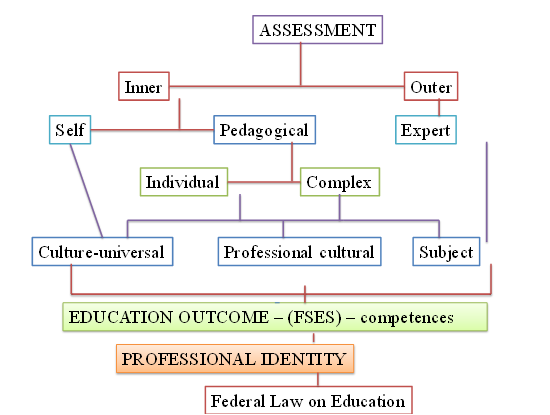
The first group is fundamental factors (characteristic of any evaluative act and determined by the psyche). As a classic example, one can cite the halo effect, which characterizes the influence of the general impression of a person on the assessment of his particular traits.
The second group is represented by differential psychological factors (there is an individual style of assessment that can be adjusted but it is a fairly stable characteristic of a personality).
The third group is conceptual external and internal factors. External factors are the environment in which an evaluator is located. Internal ones are the state of an evaluator.
Scientists have identified the ways to reduce errors in assessment. The first way is applying the methods of evaluation process formalizing (development of registration sheets, rating scales, instructions, interpreter). The second way is special training of evaluators.
The work of Tesser and Shaffer (1990) “Attitudes and attitude change” and Martin (1994) “Mood as input of what we think about how we feel determines how we think” showed that subjective assessment influences our mental image of a subject much more than any other factor.
1. Formation of the cognitive component was assessed by the products of educational activities (assessment) and in the process of the survey (the result of self-assessment)
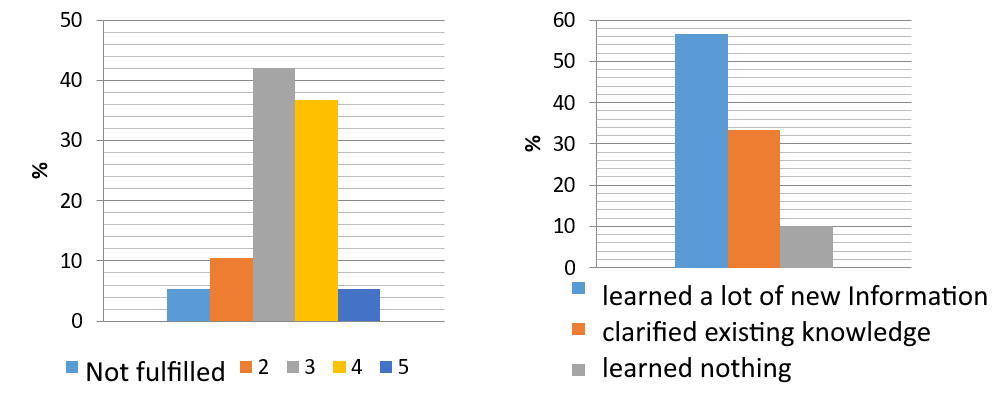
Comparison of the results of an objective assessment and self-assessment of developing the cognitive component of the final year of extramural courses revealed a more positive attitude towards the knowledge gained by the students themselves, in contrast to the assessment of the expert group (Figure
2. Assessment of the ability to organize educational activities (the ability to create the theoretical framework of a thesis) and determine the significance of this work for the students themselves.
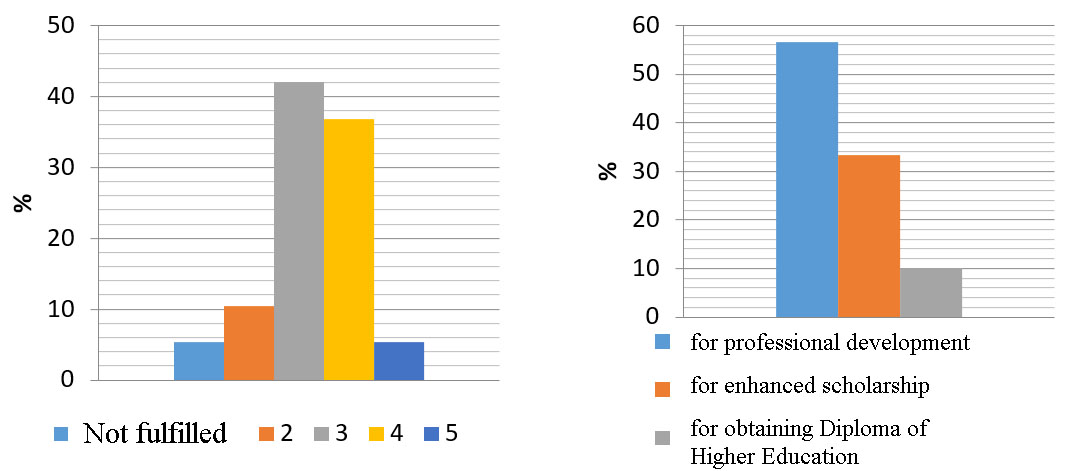
The processed diagnostic results revealed some similarities between the results of assessment and self-assessment of the significance and the level of fulfillment (ability to perform) and the design of one’s own activities (Figure
3. Understanding future professional activity was determined through the ability to determine the object and subject of professional activity.
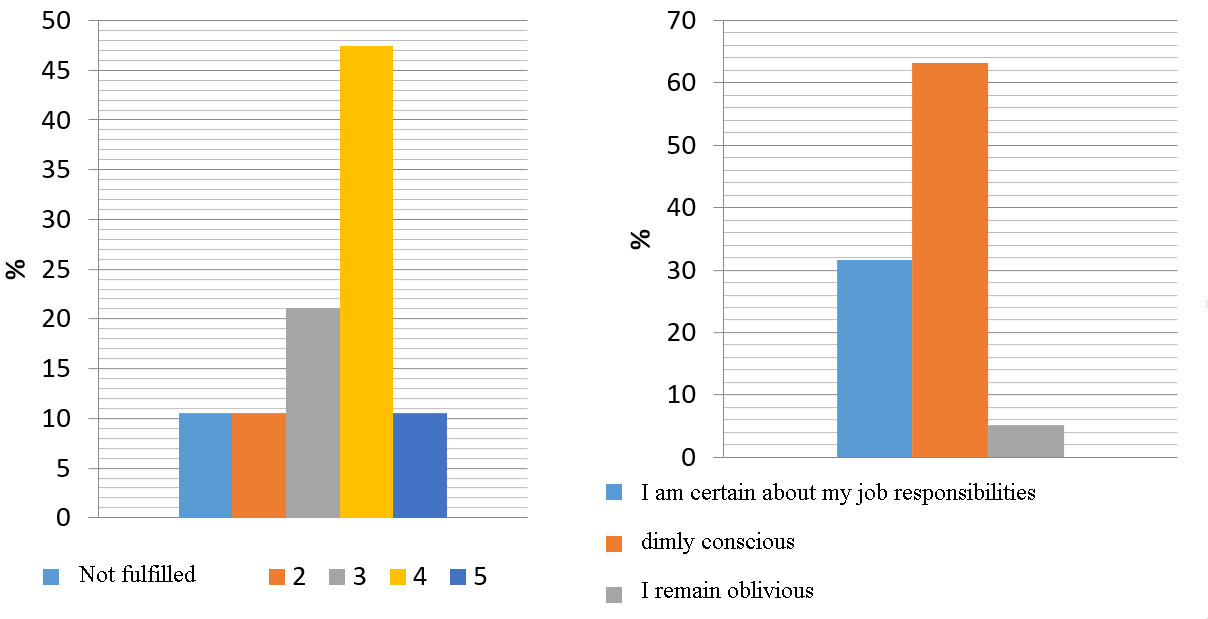
The results of self-assessment of future professional activity understanding by bachelor-ecologists show that graduates are still dimly aware of their professional functions. However, this cannot be said about a graduate qualification work; according to experts, the majority of students understand it more competently (Figure
A positive emotional attitude to the chosen profession was revealed in the process of observing students in the classrooms of pedagogical workshops while developing a model and design of a theoretical framework of the thesis and during the reflexion of classes results. A small number of students have not learned the essence of professional activity. Most of the students, however, were highly interested in the activity (Figure
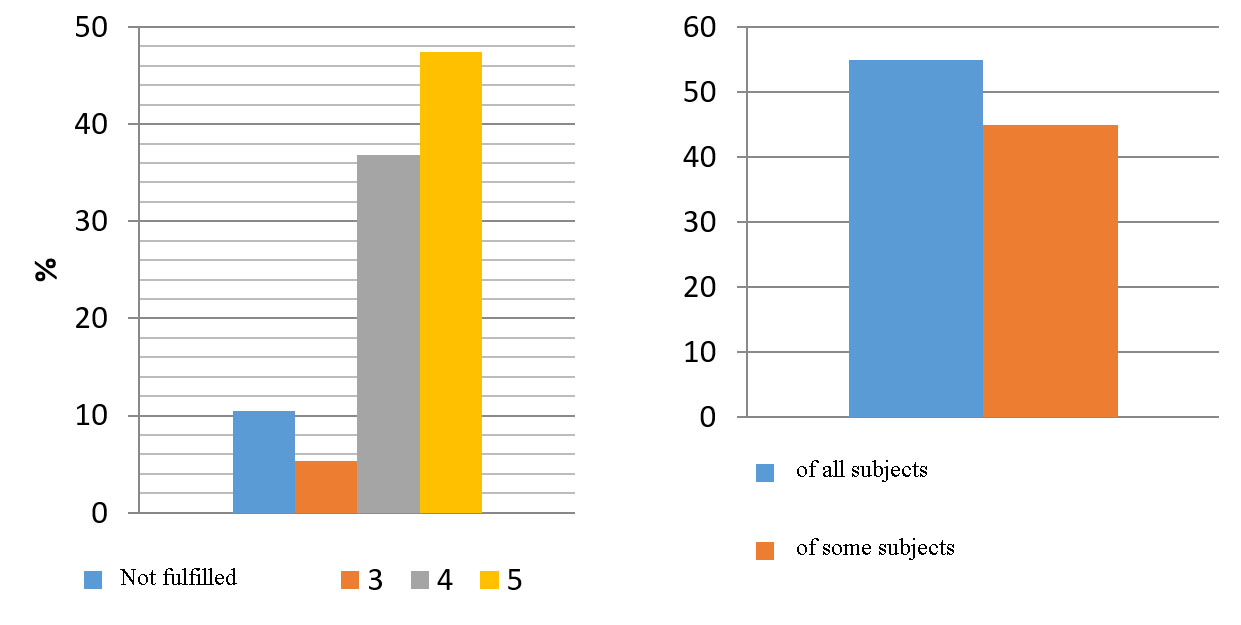
4. Features of behavior organization were determined by observations of the students’ behavior in the proposed pedagogical situation.
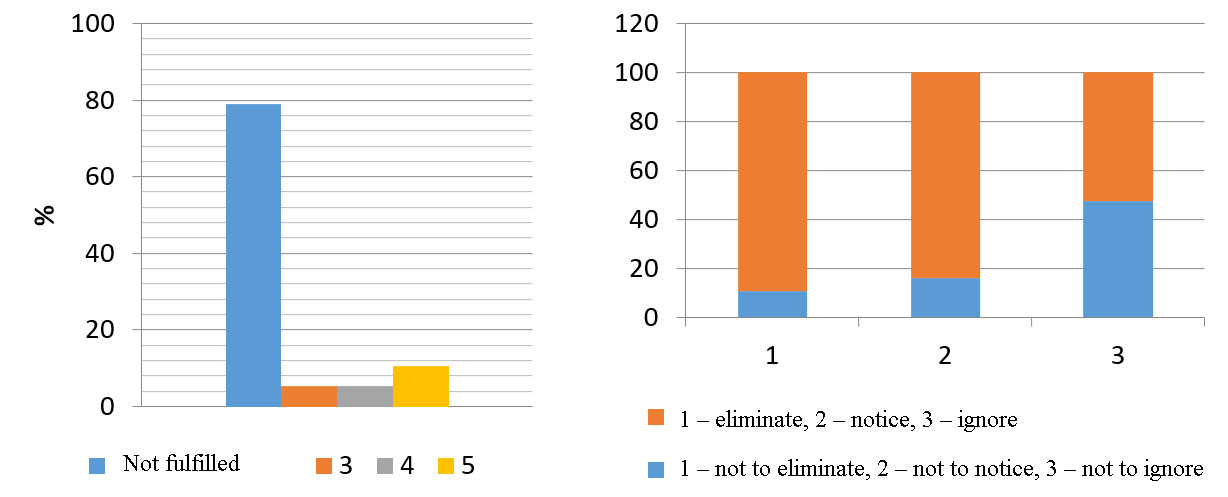
The proposed situation is as follows: what will you do when you see the following in a forest protected zone (situation of choice): 1 garbage – I will not take out the garbage / will remove not only my garbage but also my friend’s garbage; 2 protected plants – I will pretend that I did not notice a person tearing flowers / I will not allow collecting rare plants, I will lecture this person; 3 animals that need help – I will feed and try to find a shelter for animals / pass by, it’s impossible to resque all animals.
The results of observation, unfortunately, show a low level social activity development, although the students themselves believe that in these situations they could be more active. In this aspect, there is a sharp discrepancy between self-presentation (the desire to look more presentable) and the actual behavior (Figure
Conclusion
The main concepts of the study were to obtain objective information concerning the level of personal, metasubject and subject training outcomes, professional identity of a university graduate. This led to the search and selection of methods for the implementation of an integrated assessment procedure in combination with students’ self-assessment.
The need to identify high-quality tools for assessing personal, metasubject and subject results, self-assessment required the use of external assessment methods in diagnostics (in this case, humanitarian examination of activity products) and conducting questionnaires for students to reflect on their educational activities.
The combination of methods of external (objective) assessment and internal (self-assessment) one and analysis of the results enabled to conclude that in the assessment it is necessary to take into account the combination of regulatory requirements and developed criteria.
The study results subjected to statistical processing confirmed the need to develop psychological and pedagogical approaches and a special diagnostic technique.
References
- Akimova, O. I. (2017). On approaches to assessing the quality of pedagogical education in a modern university. Kazan Pedagogical Journal, 2(121), 55–58.
- Amonoshvili, Sh. A. (1984). Educational and pedagogical functions of evaluating schoolchildren teachings. Moscow: Pedagogy.
- Ananyev, B. G. (1935). Psychology of pedagogical assessment. Proceedings of the Institute for the Study of the Brain named after V.M. Bekhtereva, vol. VI. Leningrad.
- Antipin, I. O. (2014). Socio-pedagogical assessment of professional activities of general educational institution staff as a mechanism for independent assessment of the quality of education. Education and science, 7(116), 24–35.
- Barrett, P. M., Webster, H. M., & Wallis, J. R. (1999). Adolescent self-esteem and cognitive skills training: a school-based intervention. Journal of Child and Family Studies, 8(2), 217–227.
- Baturin, N. A. (2008). Psychology of assessment: general concepts, differentiation of concepts and areas of study. Bulletin of the South Ural State University: Psychology, 31, 17–31.
- Baturin, N. A., & Karlyshev, G. V. (2009). Accuracy of professional assessment and ways to improve it. Bulletin of the South Ural State University: Psychology, 18, 11–17.
- Baturin, N. A., & Yusupova, Yu. L. (2008). Changes in estimates due to various factors. Bulletin of the South Ural State University: Psychology, 33, 4–17.
- Bodalev, A. A. (1970). On the question of evaluation standards. Bulletin of the Leningrad State University, 17, 54–57.
- Chikova, O. M. (2014). Vectors of the relationship between the characteristics of intelligence and the rating of knowledge of bachelors of psychological and pedagogical specialties. Theory and practice of social development, 19, 220–223.
- Holdnak, B. J., Clemons, T. C., & Bushardt, S. C. (1990). Evaluation of organisation training by the solomon fourgroup design: a field study in self-esteem training. Journal of Managerial. Psychology, 5(5).
- Isaeva, T. E. (2013). Assessment of quality of higher education through the prognostic type of teacher’s pedagogical culture. Modern scientific research and their practical application, 21308, 630–640.
- Koksharova, E. A. (2009). Selection of performance criteria for a pedagogical expert system that assesses the quality of learning tests. Bulletin of the Adygeya State University: Pedagogy and Psychology, 4, 60–63.
- Kovalev, A. G. (1975). Collective and socio-psychological problems of leadership. Moscow: Politizdat.
- Kovel, M. I., Glinkina, G. V., & Zorina, V. L. (2009). Preparing teachers to form an objective assessment and self-assessment of students as one of the urgent problems of modern pedagogical professional education. Siberian Pedagogical Journal, 13, 291–296.
- Kozachek, O. V. (2008). Seminar classes on child psychology in a pedagogical university with a rating of students’ knowledge. The psychology of learning, 10, 73–88.
- Losev, Yu. N. (2018). Self-analysis and self-assessment of the teacher as an integral part of professional self-improvement. Bulletin of pedagogical experience, 41, 40–46.
- Lyakh, Yu. A. (2017). Analysis of assessment systems used in Russian and foreign teaching practice. Humanities and education, 2(30), 49–53.
- Makotorova, G. V. (2018). Tendencies and regularities of the process of using digital resources and technologies in the development of the research potential of schoolchildren. Bulletin of Vladimir State University named after Alexander Grigorievich and Nikolai Grigorievich Stoletovs: Pedagogical and psychological sciences, 32(51), 14–29.
- Makshantseva, L. V. (2016). The ratio of psychological and pedagogical assessments in education. Social technologies, research, 3(77), 31–36.
- Martin, L. L. (1994). Mood as input what we think about how we feel determines how we think. Hillsdale; New Jersey: Lawrence Erlbaum Associates.
- Myasishchev, V. N. (1960). Personality and neurosis. Leningrad.
- Neumoeva-Kolchedantseva, E. V., & Polovnikova, O. Yu. (2017). Pedagogical assessment in the activity of a primary school teacher. Siberian teacher, 6(115), 38–41.
- Neumoeva-Kolchedantseva, E. V., Verkhovtsev, K. N., & Verkhovtseva, M. S. (2016) Assessment of value potential of educational environment of a pedagogical university. Kazan science, 12, 184–187.
- Orlenko, H. G. O., & Malyk, I. (2017). Formation of adequate self-esteem in tennis players in the system of psychological training. Journal of Physical Education and Sport, 17(1), 66–69.
- Schneider, L. B. (2001). Professional Identity: Structure, Genesis, and Formation Conditions. Moscow.
- Shekar, S. C., & Suganthi, L. (2015). Evaluation of workplace training: the role of emotional intelligence, self-esteem, motivation and achievement. International Journal of Business Excellence, 8(6), 798–816.
- Sholotonov, E. S. (2015). Evaluation of academic staff on the basis of competence-based approach. University Bulletin (State University of Management), 9, 268–272.
- SlovarCC (2010). Large modern dictionary of the Russian language Retrieved from: https://slovar.cc/rus/ tolk/72449.html
- Smoll, F. L., Smith, R. E., & Barnett, N. P. (1993). Enhancement of children's self-esteem through social support training for youth sport coaches. Journal of Applied Psychology, 78(4), 602–610.
- Tesser, A., & Shaffer, D. (1990). Attitudes and Attitude change. Review of Psychology, 41, 479–523.
- Trainev, I. V. (2013). Use of expert parametric estimation methods based on the results of the implementation of information and educational projects. Information and telecommunication technologies, 18, 70–77.
- Tugarinov, V. P. (1971). Philosophy of Consciousness. Moscow: Thought.
- Tzacheva, A., & Jaishree, R. (2018). Emotion mining from student comments a lexicon based approach for pedagogical innovation assessment. European Journal of Education and Applied Psychology, 3, 3–13.
- Voronova, T. A., & Malygin, A. A. (2018). Normative and psychological-pedagogical approaches to independent assessment of quality of conditions of educational activities of educational organizations. Bulletin of Ivanovo State University: Natural, social sciences, 1, 27–36.
- Zhigalev, B. A. (2009). Pedagogical system for assessing quality of education at university: current state and development prospects. Bulletin of Nizhny Novgorod University. N.I. Lobachevsky, 1, 24–29.
Copyright information

This work is licensed under a Creative Commons Attribution-NonCommercial-NoDerivatives 4.0 International License.
About this article
Publication Date
28 December 2019
Article Doi
eBook ISBN
978-1-80296-075-4
Publisher
Future Academy
Volume
76
Print ISBN (optional)
-
Edition Number
1st Edition
Pages
1-3763
Subjects
Sociolinguistics, linguistics, semantics, discourse analysis, science, technology, society
Cite this article as:
Nesgovorova*, N., Savelev, V., Tebenkova, E., & Prokopyeva, M. (2019). Comparative Analysis Of Objective Assessment And Self-Assessment Of University Graduates Professional Identity. In D. Karim-Sultanovich Bataev, S. Aidievich Gapurov, A. Dogievich Osmaev, V. Khumaidovich Akaev, L. Musaevna Idigova, M. Rukmanovich Ovhadov, A. Ruslanovich Salgiriev, & M. Muslamovna Betilmerzaeva (Eds.), Social and Cultural Transformations in the Context of Modern Globalism, vol 76. European Proceedings of Social and Behavioural Sciences (pp. 2449-2459). Future Academy. https://doi.org/10.15405/epsbs.2019.12.04.328
